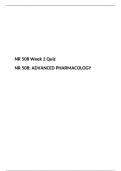-
1. Exam (elaborations) - Nr 508 week 7 reflection td, nr 508 advanced pharmacology, chamberlain college of nur...
-
2. Exam (elaborations) - Nr 508 week 6 td, nr 508 advanced pharmacology, chamberlain college of nursing
-
3. Exam (elaborations) - Nr 508 week 5 td, nr 508 advanced pharmacology, chamberlain college of nursing
-
4. Exam (elaborations) - Nr 508 week 3 td and quiz, nr 508 advanced pharmacology, chamberlain college of nursi...
-
5. Exam (elaborations) - Nr 508 week 2 td and quiz, nr 508 advanced pharmacology, chamberlain college of nursi...
-
6. Exam (elaborations) - Nr 508 week 1 td and quiz, nr 508 advanced pharmacology, chamberlain college of nursi...
-
7. Exam (elaborations) - Nr 508 week 1 quiz-answer-(version 2) 25qa, nr 508: advanced pharmacology, chamberlai...
-
8. Exam (elaborations) - Nr 508 week 1 quiz-answer-(version 1) 25qa, nr 508: advanced pharmacology, chamberlai...
-
9. Exam (elaborations) - Nr 508 week 2 quiz-answer-(version 4) 25qa, nr 508: advanced pharmacology, chamberlai...
-
10. Exam (elaborations) - Nr 508 week 2 quiz-answer-(version 3) 25qa, nr 508: advanced pharmacology, chamberlai...
-
11. Exam (elaborations) - Nr 508 week 2 quiz-answer-(version 2) 25qa, nr 508: advanced pharmacology, chamberlai...
-
12. Exam (elaborations) - Nr 508 week 2 quiz-answer-(version 1) 25qa, nr 508: advanced pharmacology, chamberlai...
-
13. Exam (elaborations) - Nr 508 week-3 quiz (version 2), nr 508: advanced pharmacology, chamberlain college of...
-
14. Exam (elaborations) - Nr 508 week-3 quiz (version 1), nr 508: advanced pharmacology, chamberlain college of...
-
15. Exam (elaborations) - Nr 508 week 4 midterm (version 5), nr 508: advanced pharmacology, chamberlain college...
-
16. Exam (elaborations) - Nr 508 week 4 midterm (version 4), nr 508: advanced pharmacology, chamberlain college...
-
17. Exam (elaborations) - Nr 508 week 4 midterm (version 3), nr 508: advanced pharmacology, chamberlain college...
-
18. Exam (elaborations) - Nr 508 week 4 midterm (version 2), nr 508: advanced pharmacology, chamberlain college...
-
19. Exam (elaborations) - Nr 508 week 4 midterm (version 1), nr 508: advanced pharmacology, chamberlain college...
-
20. Exam (elaborations) - Nr 508 pharm midterm study guide (version 2), nr 508: advanced pharmacology, chamberl...
-
21. Exam (elaborations) - Nr 508 pharm midterm study guide (version 1), nr 508: advanced pharmacology, chamberl...
-
22. Exam (elaborations) - Nr 508 week 5 quiz-answer, nr 508: advanced pharmacology, chamberlain college of nurs...
-
23. Exam (elaborations) - Nr 508 week 6 quiz (version 3), nr 508: advanced pharmacology, chamberlain college of...
-
24. Exam (elaborations) - Nr 508 week 6 quiz (version 2), nr 508: advanced pharmacology, chamberlain college of...
-
25. Exam (elaborations) - Nr 508 week 6 quiz (version 1), nr 508: advanced pharmacology, chamberlain college of...
-
26. Exam (elaborations) - Nr 508 week 7 quiz (version 2), nr 508: advanced pharmacology, chamberlain college of...
-
27. Exam (elaborations) - Nr 508 week 7 quiz (version 1), nr 508: advanced pharmacology, chamberlain college of...
-
28. Exam (elaborations) - Nr 508 final exam answer, nr 508: advanced pharmacology, chamberlain college of nursi...
-
29. Exam (elaborations) - Nr508 final exam questions & answers (verified) test bank-answers, nr 508: advanced p...
-
30. Exam (elaborations) - Nr 508 final exam study guide, nr 508: advanced pharmacology, chamberlain college of ...
-
Show more




